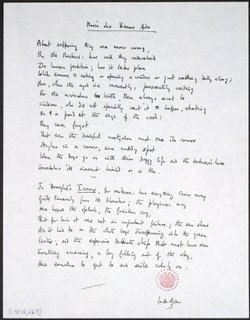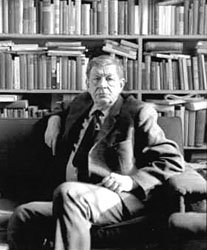 W. H. Auden said, "In my opinion sermons should be [a] fewer [b] longer [c] more theologically instructive and less exhortatory. I must confess that in my life I have very seldom heard a sermon from which I derived any real spiritual benefit. Most of them told me that I should love God and my neighbour more than I do, but that I knew already."
W. H. Auden said, "In my opinion sermons should be [a] fewer [b] longer [c] more theologically instructive and less exhortatory. I must confess that in my life I have very seldom heard a sermon from which I derived any real spiritual benefit. Most of them told me that I should love God and my neighbour more than I do, but that I knew already."His first experience of worship was of "exciting mysterious rituals" rather than sermons, and this "implanted in me what I believe to be the correct notion of worship, namely, that it is first and foremost a community in action, a thing done together, and only secondarily a matter of individual feeling or thinking."

I don't agree with Auden regarding points [a] or [b]. Against point [a], I do think a weekly homily is a needed aspect of life in our age in our North American environs. Because we are living in such a violently materialistic time, the spiritual weapons of Christ's Gospel need to be forged in us on a weekly basis; perhaps even more so during Lent. Again, with regard to point [b], I think longer homilies are counter-productive; too much listening leads to most people turning slightly dull of hearing. A short and focussed sermon makes a few points that will have a better chance to stick. But oddly in the light of his thoughts on homilies, I confess that I concur with his experience of worship. Surely as any Orthodox would? He seems to be touching upon the sacramental aspect of worship; and aren't these the types of heavenly realities for us in the Church? Does he not also touch upon the fundamental authentic Christian truth that worship is corporate and not individualistic?

7 comments:
did saint john chrysostom preach 2-3 hour sermons? they still called him "golden mouthed."
our culture is no longer an oral culture in the way ancient cultures were and thus we can no longer handle long stretches of spoken word. and we definitely need to be taught the elements of the faith by those who have the gift to do so and that involved not only reading ourselves but also sitting at the feet of the teacher and hearing the words. i'm still a believer in hearing the words.
appreciate your posts. keep it up.
2-3 hrs? I would guess that is on the extreme long end from various patristic homilies I have read. sorry, but that is too long for a good lecture, let alone a homily! If a priest can't make a few points in 15-25 minutes than he shouldn't bother giving a sermon at all; for making others suffer because brevity and succinctness are not virtues is quite rude in my view. also, i think comparing the largely uneducated oral cultures of the ancient world to ours does not show either time period clearly. there are many other variables; for example, today we have a much better grasp of the fact that most people are NOT primarily oral learners.
i am glad you like my posts.
i would have to pose the question - have humans always been visual learners? probably. but my point is that ancient cultures the voice and words was a priviledged or more utilized medium because they had what some people might call an "attention span." our persent visual culture has very little attention. a part of this might be due to a predominant cultural belief that seeing is instantaneous, the image presents itself to the viewer in a flash. but that is not so. really seeing is a kind of "theoria" and takes time.
hearing has taken the same turn. ipods, mp3 players, music everywhere you turn. we are awash in all kinds of sound and information aurally thrown at us from speakers on the street, in our ears, cars, work, etc. There is no attention, there is no patience. The belief that knowledge is effort no longer exists.
i'm not saying priests should engage in 2-3 hours sermons. too long. should they stick to 7-10 minutes as some say - no. we need to listen, we need to be taught and that simply does not happen in 7-10 minutes.
i tuess what i'm saying is our culture could definitely stand to relearn the virtue of patience and effort in pursuit of knowledge and the spiritual life.
now that's not because we are becoming more visual
humans have also always been audible learners. the Illiad and the Odyssey were regularly orated before Homer ever wrote them down.
I'm an audible learner, primarily, and if the speaker is particulary gifted, I really could just listen for hours. I've met only a few such people; Fr.Gregory from Post Falls is one, my youth pastor from my Pentecostal days is another.
Our popular culture would make us primarily visual learners, and it neglects to cultivate oral learning.
On our long drive to church, we've adapted by listening to audio books. We even take them on road trips. This has helped cultivate audible learning in my kids. If you're comfortable with more than one type of learning, life is a little easier.
If there was a point in my big ramble, feel free to find it :P
vic,
I have to disagree with you that we have neglected to cultivate oral learners. In schools it is only recently that we have even tried to teach to kids in ways other than orally. Even my teaching to high school kids is primarily oral lectures; and I try to offer kids alternative ways of learning beyond the basic audio/visual routes. And it is not easy to teach outside the audio-visual box; in my case because I was a strong oral learner and experienced success learning that way to a very high degree. And our dominant way of thinking is that, ulitmately, a person has to become an oral learner. I question that assumption.
cath.dwell:
I agree with your remarks about pop culture and how it is not set up to demand/expect an attention span. However, that has more to do with democracy and technology and relativism; a poisonous mixture at best.
I think the aristocracy of our time is as focussed as ever. But the majority focus of the current intellectual aristocracy is not on spiritual matters, more so on scientific pursuits. Indeed there are exceptions, but you'd likely agree that they prove the general rule.
Also, I concur that cultivating any learning method is shrewd, but I do think it is unwise to realize that most people have a variety of learning styles that are not audio-visual dominant. To be sure, our inherited liturgical experience is clearly aware that all the mental and physical senses of man need to be touched. In this sense, for sure we need to hold fast lest we lose out on any part of the fulness of the truth about how we experience or 'learn' about God.
A priest in Calgary gave a 16 word homily one time. I've thought about it several times since. He stood before us quiet for a good ten seconds or so.
Then he began with, "Brothers and Sisters, we need to love one another." After a good long pause he closed with, "Brothers and Sisters, we need to forgive one another."
He was quiet again for a few seconds, and then resumed Divine Liturgy. It was powerful.
hehe, you get my point precisely, Kimberely.To be sure, the most powerful homily I ever heard was delivered by (a) a saint, (b) a female and (c) it was 5 words long with a preface of 5 words.
Would you like me to share it? Here it is:
"The Gospel in five words: "..you did it to Me."
It was delivered by Mother Teresa of Calcutta.
Post a Comment